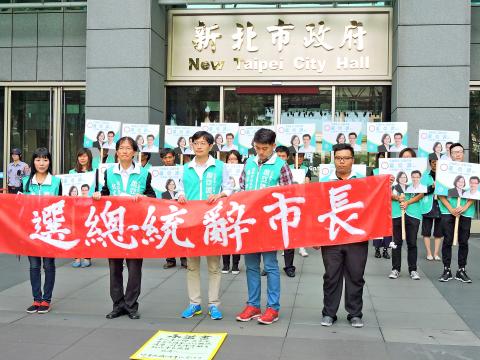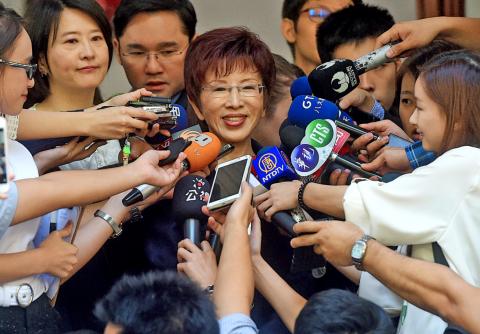Chinese Nationalist Party (KMT) Chairman Eric Chu (朱立倫) yesterday apologized for making the “reluctant, but necessary decision” to oust Deputy Legislative Speaker Hung Hsiu-chu (洪秀柱) as the party’s presidential candidate at a special party congress scheduled for Saturday.
“As chairman of the KMT, I cannot shift the blame for the party’s ongoing turmoil and dismal election campaign prospects to others. It is due to a lack of effort and communication on my part,” Chu, who is also New Taipei City mayor, said on the sidelines of a New Taipei City council meeting in the morning.
Chu apologized to his KMT comrades, before expressing his “sincerest apology” to Hung for what has happened and the KMT’s decision.

Photo: Lai Hsiao-tung, Taipei Times
A formal apology, along with a detailed explanation of the whole issue, is to be issued after today’s regular weekly meeting of the KMT’s Central Standing Committee and again after the party congress on Saturday afternoon, Chu said.
Chu’s comments came after Hung’s adamant refusal to quit the race, despite repeated calls from Chu and other party members for her to consider the “bigger picture.”
They also came after Hung on Monday night in a Facebook post questioned the rationale behind the KMT leadership’s criticism of her cross-strait policies — which she said advocate separate governance instead of division across the Taiwan Strait — for straying from the KMT’s stance and mainstream public opinion.

Photo: Chien Jung-fong, Taipei Times
“I am accused of deviating from mainstream public opinion simply because I told the truth. Is this really the case?” Hung wrote.
Asked whether Saturday’s congress would create solidarity or further division, Chu said that while unity does not necessarily translate into victory, a divided party almost always leads to failure.
“Various opinions have been voiced from within the party, which is why we intend to reach a consensus through the upcoming congress that is aimed at ‘forging consensuses and securing victory through party solidarity,’” Chu said.
He shrugged off reporters’ questions about whether he is going to replace Hung as candidate, with KMT Vice Chairperson Huang Min-hui (黃敏惠), a former Chiayi mayor, as his running mate.
“This is a hypothetical question. I will respect any decisions reached by the KMT’s representatives on Saturday as long as they are conducive to achieving consensuses and party unity,” Chu said.
When asked for comment about Chu’s apology, Hung — speaking on the sidelines of an afternoon legislative session — said whether an apology is made is not as important as conforming to the party’s internal democratic system.
She previously criticized the KMT headquarters’ decision to put her nomination to a vote at a special congress as detrimental to the KMT’s primary system.
Democratic Progressive Party presidential candidate Tsai Ing-wen (蔡英文) yesterday said that who the KMT nominates as its presidential candidate is not people’s main concern, because Taiwanese care more about having a different political party take the helm next year.

CHAOS: Iranians took to the streets playing celebratory music after reports of Khamenei’s death on Saturday, while mourners also gathered in Tehran yesterday Iranian Supreme Leader Ayatollah Ali Khamenei was killed in a major attack on Iran launched by Israel and the US, throwing the future of the Islamic republic into doubt and raising the risk of regional instability. Iranian state television and the state-run IRNA news agency announced the 86-year-old’s death early yesterday. US President Donald Trump said it gave Iranians their “greatest chance” to “take back” their country. The announcements came after a joint US and Israeli aerial bombardment that targeted Iranian military and governmental sites. Trump said the “heavy and pinpoint bombing” would continue through the week or as long

TRUST: The KMT said it respected the US’ timing and considerations, and hoped it would continue to honor its commitments to helping Taiwan bolster its defenses and deterrence US President Donald Trump is delaying a multibillion-dollar arms sale to Taiwan to ensure his visit to Beijing is successful, a New York Times report said. The weapons sales package has stalled in the US Department of State, the report said, citing US officials it did not identify. The White House has told agencies not to push forward ahead of Trump’s meeting with Chinese President Xi Jinping (習近平), it said. The two last month held a phone call to discuss trade and geopolitical flashpoints ahead of the summit. Xi raised the Taiwan issue and urged the US to handle arms sales to

State-run CPC Corp, Taiwan (CPC, 台灣中油) yesterday said that it had confirmed on Saturday night with its liquefied natural gas (LNG) and crude oil suppliers that shipments are proceeding as scheduled and that domestic supplies remain unaffected. The CPC yesterday announced the gasoline and diesel prices will rise by NT$0.2 and NT$0.4 per liter, respectively, starting Monday, citing Middle East tensions and blizzards in the eastern United States. CPC also iterated it has been reducing the proportion of crude oil imports from the Middle East and diversifying its supply sources in the past few years in response to geopolitical risks, expanding

Pro-democracy media tycoon Jimmy Lai’s (黎智英) fraud conviction and prison sentence were yesterday overturned by a Hong Kong court, in a surprise legal decision that comes soon after Lai was jailed for 20 years on a separate national security charge. Judges Jeremy Poon (潘兆初), Anthea Pang (彭寶琴) and Derek Pang (彭偉昌) said in the judgement that they allowed the appeal from Lai, and another defendant in the case, to proceed, as a lower court judge had “erred.” “The Court of Appeal gave them leave to appeal against their conviction, allowed their appeals, quashed the convictions and set aside the sentences,” the judges